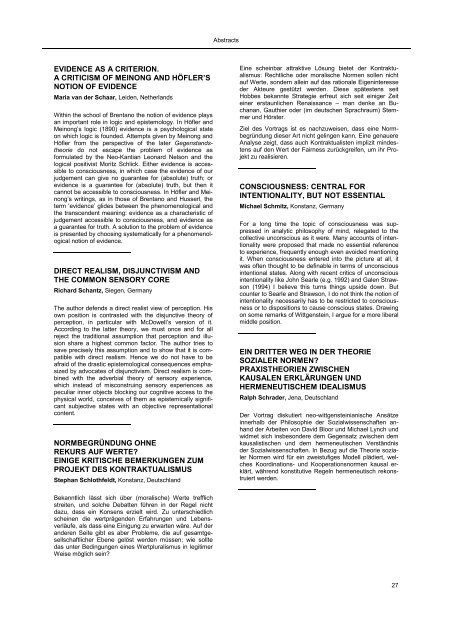Erfahrung und Analyse Experience and Analysis - Austrian Ludwig ...
Erfahrung und Analyse Experience and Analysis - Austrian Ludwig ...
Erfahrung und Analyse Experience and Analysis - Austrian Ludwig ...
You also want an ePaper? Increase the reach of your titles
YUMPU automatically turns print PDFs into web optimized ePapers that Google loves.
EVIDENCE AS A CRITERION.<br />
A CRITICISM OF MEINONG AND HÖFLER’S<br />
NOTION OF EVIDENCE<br />
Maria van der Schaar, Leiden, Netherl<strong>and</strong>s<br />
Within the school of Brentano the notion of evidence plays<br />
an important role in logic <strong>and</strong> epistemology. In Höfler <strong>and</strong><br />
Meinong’s logic (1890) evidence is a psychological state<br />
on which logic is fo<strong>und</strong>ed. Attempts given by Meinong <strong>and</strong><br />
Höfler from the perspective of the later Gegenst<strong>and</strong>stheorie<br />
do not escape the problem of evidence as<br />
formulated by the Neo-Kantian Leonard Nelson <strong>and</strong> the<br />
logical positivist Moritz Schlick. Either evidence is accessible<br />
to consciousness, in which case the evidence of our<br />
judgement can give no guarantee for (absolute) truth; or<br />
evidence is a guarantee for (absolute) truth, but then it<br />
cannot be accessible to consciousness. In Höfler <strong>and</strong> Meinong’s<br />
writings, as in those of Brentano <strong>and</strong> Husserl, the<br />
term ‘evidence’ glides between the phenomenological <strong>and</strong><br />
the transcendent meaning: evidence as a characteristic of<br />
judgement accessible to consciousness, <strong>and</strong> evidence as<br />
a guarantee for truth. A solution to the problem of evidence<br />
is presented by choosing systematically for a phenomenological<br />
notion of evidence.<br />
DIRECT REALISM, DISJUNCTIVISM AND<br />
THE COMMON SENSORY CORE<br />
Richard Schantz, Siegen, Germany<br />
The author defends a direct realist view of perception. His<br />
own position is contrasted with the disjunctive theory of<br />
perception, in particular with McDowell’s version of it.<br />
According to the latter theory, we must once <strong>and</strong> for all<br />
reject the traditional assumption that perception <strong>and</strong> illusion<br />
share a highest common factor. The author tries to<br />
save precisely this assumption <strong>and</strong> to show that it is compatible<br />
with direct realism. Hence we do not have to be<br />
afraid of the drastic epistemological consequences emphasized<br />
by advocates of disjunctivism. Direct realism is combined<br />
with the adverbial theory of sensory experience,<br />
which instead of misconstruing sensory experiences as<br />
peculiar inner objects blocking our cognitive access to the<br />
physical world, conceives of them as epistemically significant<br />
subjective states with an objective representational<br />
content.<br />
NORMBEGRÜNDUNG OHNE<br />
REKURS AUF WERTE?<br />
EINIGE KRITISCHE BEMERKUNGEN ZUM<br />
PROJEKT DES KONTRAKTUALISMUS<br />
Stephan Schlothfeldt, Konstanz, Deutschl<strong>and</strong><br />
Bekanntlich lässt sich über (moralische) Werte trefflich<br />
streiten, <strong>und</strong> solche Debatten führen in der Regel nicht<br />
dazu, dass ein Konsens erzielt wird. Zu unterschiedlich<br />
scheinen die wertprägenden <strong>Erfahrung</strong>en <strong>und</strong> Lebensverläufe,<br />
als dass eine Einigung zu erwarten wäre. Auf der<br />
<strong>and</strong>eren Seite gibt es aber Probleme, die auf gesamtgesellschaftlicher<br />
Ebene gelöst werden müssen; wie sollte<br />
das unter Bedingungen eines Wertpluralismus in legitimer<br />
Weise möglich sein?<br />
Abstracts<br />
Eine scheinbar attraktive Lösung bietet der Kontraktualismus:<br />
Rechtliche oder moralische Normen sollen nicht<br />
auf Werte, sondern allein auf das rationale Eigeninteresse<br />
der Akteure gestützt werden. Diese spätestens seit<br />
Hobbes bekannte Strategie erfreut sich seit einiger Zeit<br />
einer erstaunlichen Renaissance – man denke an Buchanan,<br />
Gauthier oder (im deutschen Sprachraum) Stemmer<br />
<strong>und</strong> Hörster.<br />
Ziel des Vortrags ist es nachzuweisen, dass eine Normbegründung<br />
dieser Art nicht gelingen kann. Eine genauere<br />
<strong>Analyse</strong> zeigt, dass auch Kontraktualisten implizit mindestens<br />
auf den Wert der Fairness zurückgreifen, um ihr Projekt<br />
zu realisieren.<br />
CONSCIOUSNESS: CENTRAL FOR<br />
INTENTIONALITY, BUT NOT ESSENTIAL<br />
Michael Schmitz, Konstanz, Germany<br />
For a long time the topic of consciousness was suppressed<br />
in analytic philosophy of mind, relegated to the<br />
collective unconscious as it were. Many accounts of intentionality<br />
were proposed that made no essential reference<br />
to experience, frequently enough even avoided mentioning<br />
it. When consciousness entered into the picture at all, it<br />
was often thought to be definable in terms of unconscious<br />
intentional states. Along with recent critics of unconscious<br />
intentionality like John Searle (e.g. 1992) <strong>and</strong> Galen Strawson<br />
(1994) I believe this turns things upside down. But<br />
counter to Searle <strong>and</strong> Strawson, I do not think the notion of<br />
intentionality necessarily has to be restricted to consciousness<br />
or to dispositions to cause conscious states. Drawing<br />
on some remarks of Wittgenstein, I argue for a more liberal<br />
middle position.<br />
EIN DRITTER WEG IN DER THEORIE<br />
SOZIALER NORMEN?<br />
PRAXISTHEORIEN ZWISCHEN<br />
KAUSALEN ERKLÄRUNGEN UND<br />
HERMENEUTISCHEM IDEALISMUS<br />
Ralph Schrader, Jena, Deutschl<strong>and</strong><br />
Der Vortrag diskutiert neo-wittgensteinianische Ansätze<br />
innerhalb der Philosophie der Sozialwissenschaften anh<strong>and</strong><br />
der Arbeiten von David Bloor <strong>und</strong> Michael Lynch <strong>und</strong><br />
widmet sich insbesondere dem Gegensatz zwischen dem<br />
kausalistischen <strong>und</strong> dem hermeneutischen Verständnis<br />
der Sozialwissenschaften. In Bezug auf die Theorie sozialer<br />
Normen wird für ein zweistufiges Modell plädiert, welches<br />
Koordinations- <strong>und</strong> Kooperationsnormen kausal erklärt,<br />
während konstitutive Regeln hermeneutisch rekonstruiert<br />
werden.<br />
27












